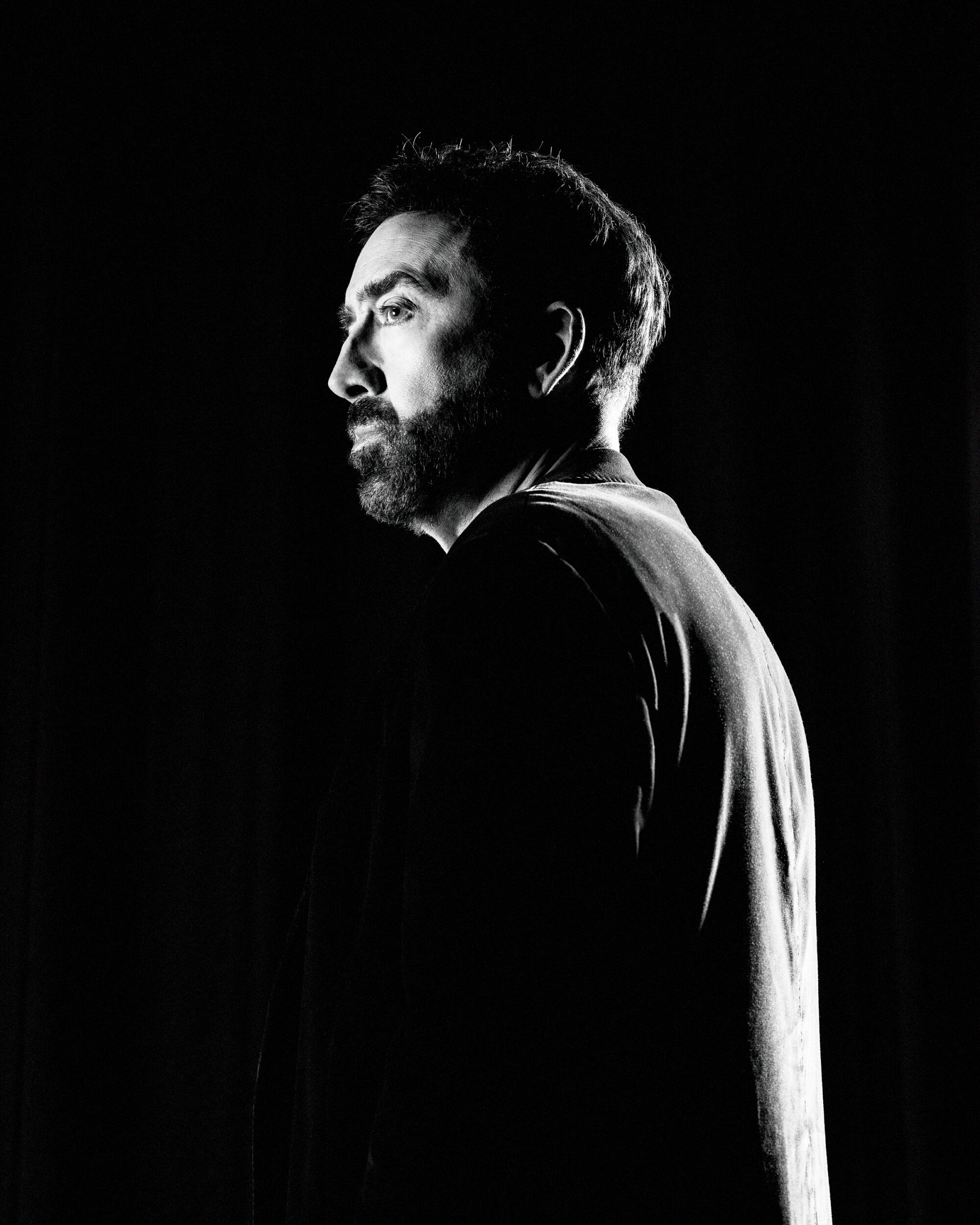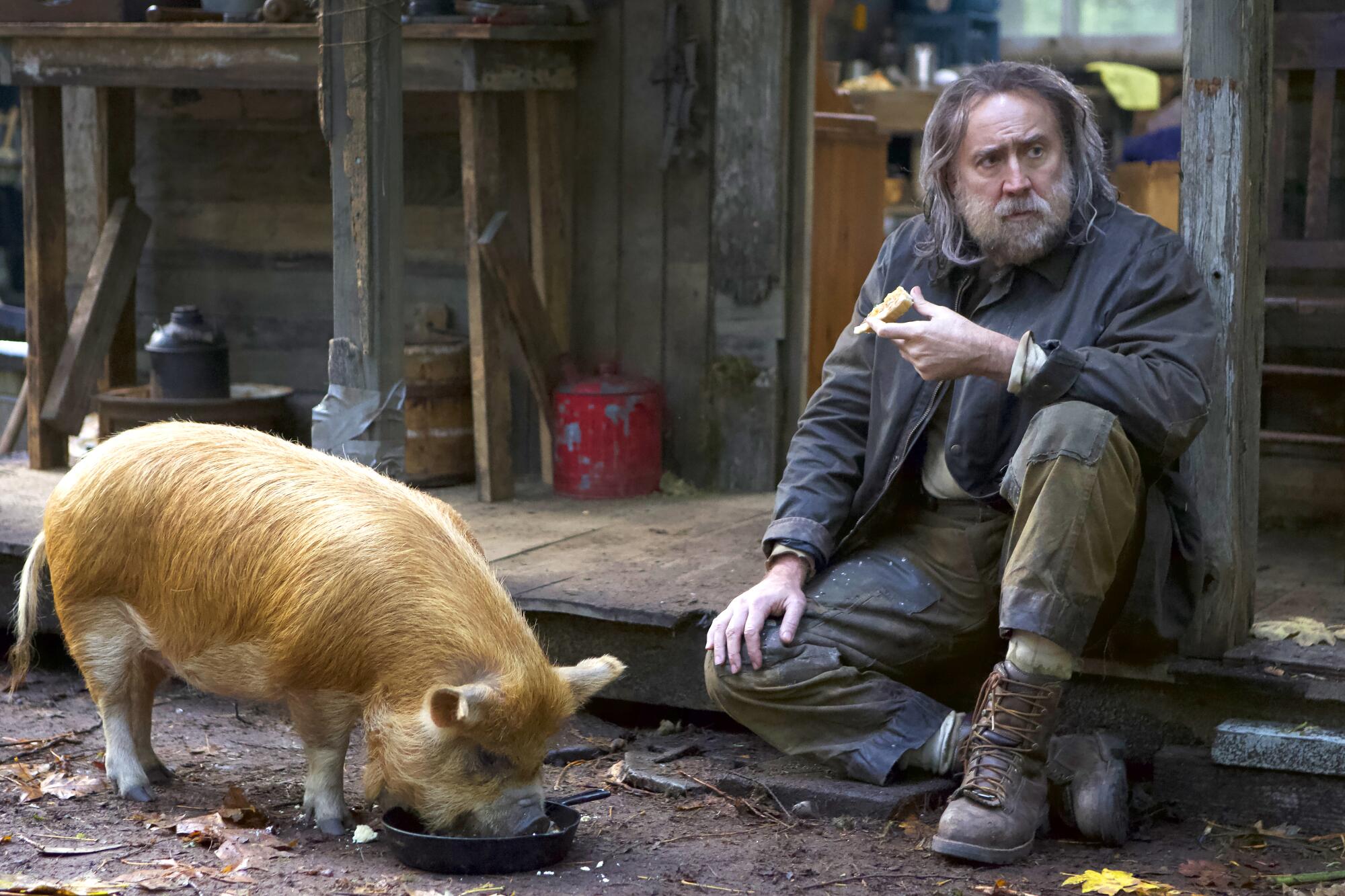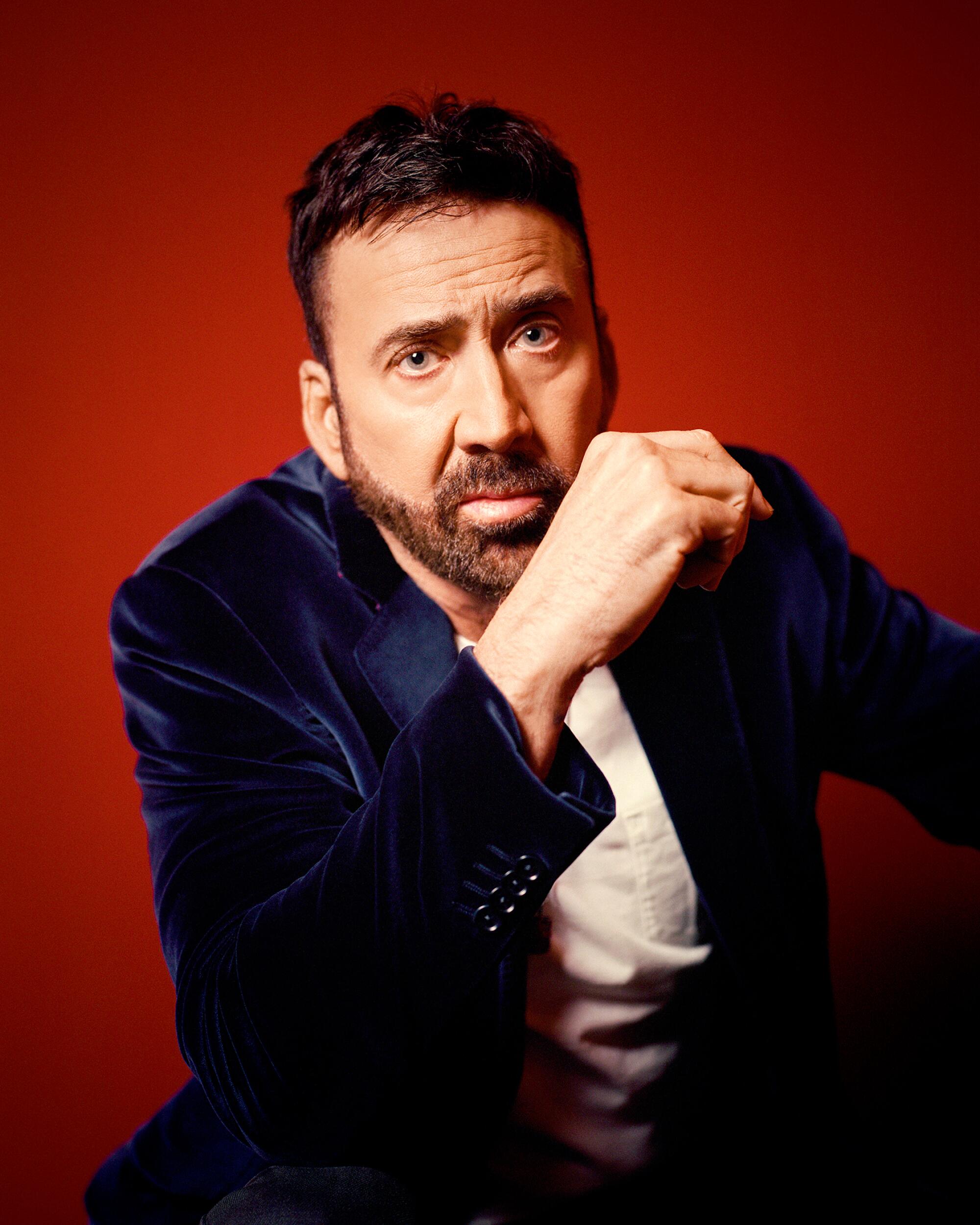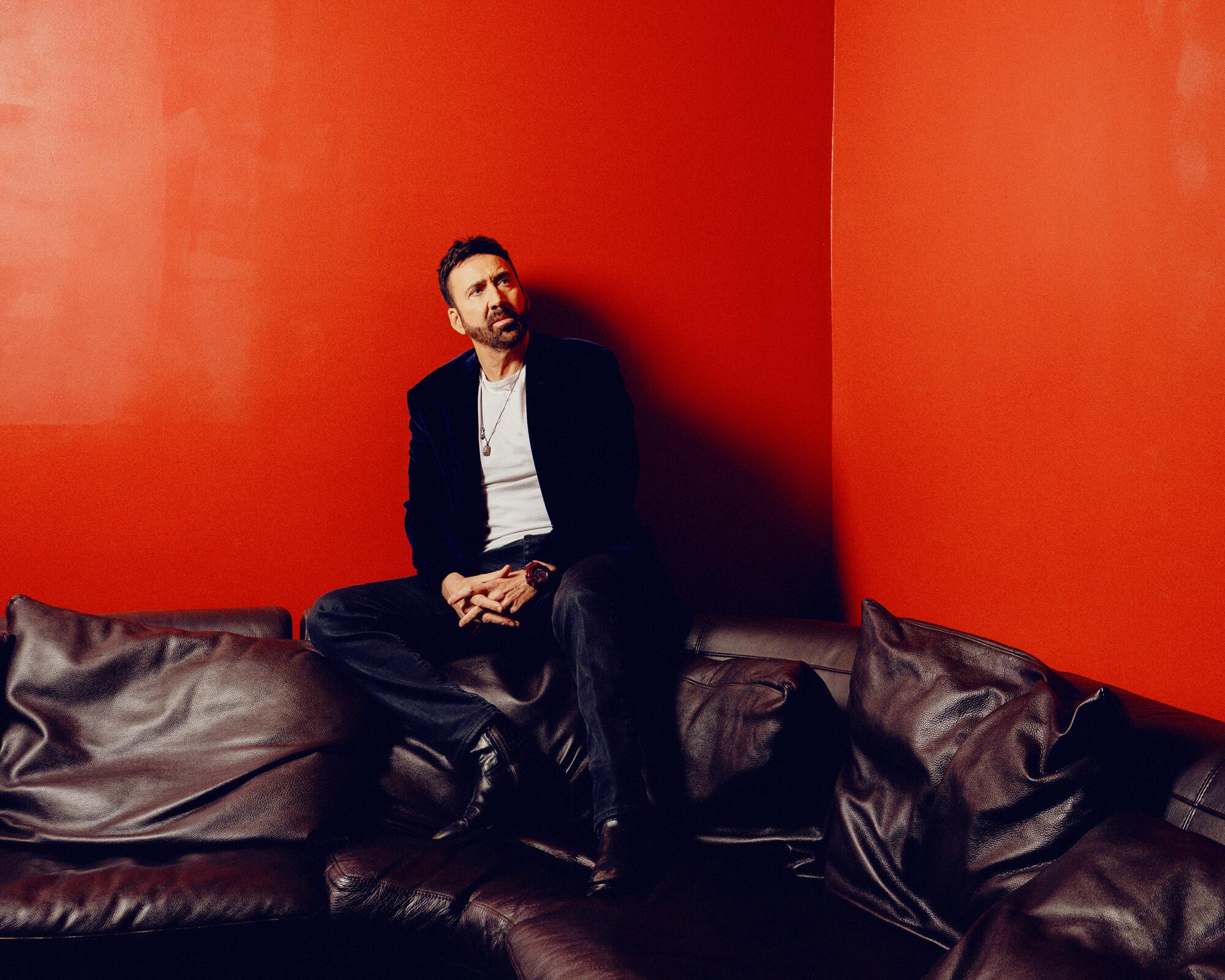
Nicolas Cage and I are sitting in the middle of the Nuart Theatre, the art house bastion that has been a fixture on Santa Monica Boulevard since it opened in 1930. Cage saw David Lynch’s “Eraserhead” here, more than once, midnight showings that remain indelibly etched in his mind. He took his son Weston to the Nuart to see a James Dean double feature of “Rebel Without a Cause” and “East of Eden” because he wanted him to feel the power of great acting and learn from the legend who inspired Cage to pursue movies as a career.
“I used to work at the Fairfax Cinema on Beverly, selling tickets and popcorn,” Cage says. “It was my first job. I was 15 and all I cared about was cinema. I wanted to be in movies. Cinema had always been a friend to me as a child. It helped me through different difficult periods. So working at the Fairfax, in between whatever I had to do, I would just stand in the back of the theater and dream. How am I going to go from here,” and Cage pauses, pointing first to his seat and then to the screen in front of us, “to there? That was the meditation.”
If you love movies, you know that Cage made it from here to there and back again in a singular career that began with a small part in “Fast Times at Ridgemont High,” took off with the Coen brothers’ “Raising Arizona” and the romantic-comedy “Moonstruck,” put him onstage at the Oscars (“Leaving Las Vegas”), made him a blockbuster action hero (“The Rock,” “Con Air,” “Face/Off”) and then leveled off when, as Cage puts it, he became “marginalized by the studio system.”
“I had a couple of flops in a row, so I was no longer invited,” Cage says, matter-of-factly, without complaint. When I tell him that it’s hard to understand how he could act in around three dozen movies in the last decade, most of them direct-to-video, and not have one decent, interesting offer from a studio, Cage, 58, replies: “Well, you and me both. But it’s OK.”

It’s OK because, as mentioned, Cage never stopped working. And the last movie he made, Neon’s “Pig,” has won him his best reviews in years, rekindling an interest in the actor both from audiences and studios. In April, Cage will be seen — twice — in Lionsgate’s “The Unbearable Weight of Massive Talent,” playing a marginalized movie star named Nicolas Cage who, thanks to a little problem with bad spending habits, takes a $1 million payday to appear at a super fan’s birthday party. Things go sideways, and Cage is haunted by an alter ego, Nicky Cage, who derides Nicolas’ career choices, telling him it’s time to stop acting in all these crummy art house movies.
“I was very trepidatious to do it because I’m playing two heightened versions of myself,” Cage says. “But then I realized, everything that’s happened to me led up to this movie, whether I was hot or cold, up or down ... there’s an arc to the story. Not that I’m comparing myself to Muhammad Ali, but I like it that he lost to Joe Frazier and then went back, fought him again and won. That gives it a pathos and a dramatic arc.”
There’s a touch of pathos to spending time with Cage ... but just a tinge. Regrets? He has a few. But then again, too few to mention. We were, for some reason, singing “My Way” together shortly after we met. Cage’s birthday is Jan. 7. I was born a day later. “You got Elvis and David Bowie ... they’re my heroes,” Cage says, referring to the two rock stars who share my birthday. Cage, it turns out, had just been listening to Presley’s version of “Always on My Mind” — he had it on repeat — and, unprompted, he starts in, showing off his baritone.
“Little things I should have said and done ... he loses it on the word ‘said,’” Cage says. His connection to the King runs deep. He was married to Presley’s daughter, Lisa Marie, for a spell and played an Elvis obsessive in David Lynch’s “Wild at Heart.” “It’s clear to me that Elvis was an opera singer,” Cage says, launching into another verse of “Always on My Mind.” He smiles. “I like to sing. It helps me relax.”

Cage says he accepted the role of Rob, the burned-out star chef in “Pig,” a man haunted by tragedy and, yes, the theft of his beloved truffle-hunting pig, because of one line in the script. It comes during a scene in which Rob meets Derek, a former prep cook who now runs a trendy, pretentious Portland restaurant.
“We’re interested in taking local ingredients native to this region and deconstructing them, making the familiar feel foreign,” Derek tells Rob, explaining the restaurant’s “concept.” Rob looks at him incredulously, reminding him that his dream was to open a real English pub. He launches into a reprimand that culminates with the line that hooked Cage, “We don’t get a lot of things to really care about.”
“That’s what it’s all about,” Cage says. Earlier, we had been talking about karaoke, something Cage really cares about but no longer does in public after someone filmed him performing what he calls a punk-rock version of Prince’s “Purple Rain” two years ago. (“I like my version of it, but it’s not to everyone’s tastes,” Cage says. “They made that clear.”)
What else does Cage really care about these days? He’s earnest and thoughtful as he reels off a list of his favorite things. He starts the list with his wife, Riko Shibata. “I’m really happily married. I know five is a lot,” he says, a nod to the number of times he has wed, “but I think I got it right this time.”
He also cares about his cat, Merlin, a 4-year-old Maine Coon, that Cage more than once calls his “best friend.” He cares about his two grown sons, Weston and Kal-El. He has two other animals, a cat named Teegra, who apparently doesn’t mind that he rates second to Merlin (“He doesn’t give a s—”) and a crow, Hoogan, who lives in a geodesic dome at Cage’s home in Las Vegas. (“He has taken to calling me names ... it’s comical, at least, it is to me,” Cage says. “When I leave the room, he’ll say, ‘Bye,’ and then go, ‘A—.’” Cage laughs. “Crows are very intelligent. And I like their appearance, the Edgar Allan Poe aspect. I like the goth element. I am a goth.”

Which partly explains why Cage happily signed on to play Dracula in an upcoming Universal Pictures horror-comedy, “Renfield.” As Cage has previously portrayed a man convinced he was a vampire (“Vampire’s Kiss”) and has himself been accused of being a vampire (“I don’t drink blood,” he told David Letterman in 2012), this casting seemed both inevitable and necessary. Cage starts shooting the movie next month.
“The key, I think, is movement,” Cage says, “I saw a movie called ‘Malignant’ and the director James Wan and the actress [Annabelle Wallis] created this choreography that was terrifying. So I’m hoping to do something like that where Dracula can either glide or move like Sadako in ‘Ringu.’”
He has other thoughts on the subject, of course, talking about how much he enjoyed Bela Lugosi’s turn in the 1931 “Dracula,” Frank Langella in the 1979 “Dracula” and Gary Oldman in his uncle Francis Ford Coppola’s 1992 film, “Bram Stoker’s Dracula.” (“I called Uncle,” Cage usually calls Coppola “Uncle” or “Uncle Francy” in conversation, “and told him that every frame of that movie is a work of art.”) And that leads to a discussion of acting in general, long, interesting digressions on the styles of James Cagney and Edward G. Robinson and how he believes actors like Brando channeled their easy, naturalistic acting.
“Which is a word I don’t like anymore, ‘acting,’” Cage says. “I sound like a pretentious fart for saying ‘thespian’ but acting now has become like lying. It sounds like I’m lying. If you’re a great actor, you’re a great liar. ‘Thespian’ seems more like it’s about finding some truth within and then projecting it for others to get it. At least, it does to me.” He lets out a self-aware laugh. “But I’m not always on the same wavelength as everyone else.”
More to Read
From the Oscars to the Emmys.
Get the Envelope newsletter for exclusive awards season coverage, behind-the-scenes stories from the Envelope podcast and columnist Glenn Whipp’s must-read analysis.
You may occasionally receive promotional content from the Los Angeles Times.







